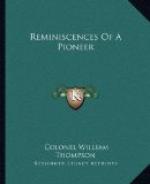On the morning of the 16th all was astir and as day began to break the troops were all drawn up in line. I had determined to cross the trail with Perry and was sitting on my horse when I heard a man hallo “O,” and as I turned my head heard the report of his gun. The fellow, a recruit in Mason’s battalion of regulars, had deliberately shot off his great toe to keep from going into the fight. He pulled the trigger of his gun and halloed, before the gun was discharged. I mention this to show the difference in men. Here was a poor weak devil who would rather maim himself for life than to face danger where he might be killed, but it is safe to say that nine-tenths of the rest would have gone even after the loss of the toe.
We arrived in sight of the rim of the bluff about 2 o’clock and saw the Indian pickets. Colonel Perry threw out a skirmish line and the advance was ordered. Before getting within rifle range the pickets disappeared and we took possession. I now got my first view of the lava beds, as they stretched black and forbidding nearly a thousand feet below. A fog rested over the lake, but we could soon see through the rifts along the lake shore the Indians on horseback coming out to attack us. They appeared like phantom horsemen, and our Indian guide told us they were coming out to attack us, as there were “only a few and they are afoot.” A few had reached the bluff and had begun a scattering fire, when we heard several shots that appeared to come directly from the stronghold. The Indian guide told us he thought they were killing some Indians that did not want to fight. As he had relatives among them the poor fellow showed the distress he felt. A few minutes later we heard several more shots, and I told Colonel Perry I heard Bernard’s bugle. A few minutes later the clear notes of the bugle rang out clear and distinct, though it was fully five miles away. Yet in that clear, cold, dry atmosphere every note sounded as clear and distinct as though but a mile away. Bernard’s column had followed the lake, and under cover of the fog enveloping the shore, had approached much nearer than his orders contemplated. He was at once savagely attacked and all evening the rattle of the guns sounded like many bunches of fire crackers. Repeatedly we heard him sound the charge and we all fretted that we could not descend and join in the battle. Perry’s men were desperately afraid that “the Apache boys,” as Bernard’s men were called, would clean out the Indians and leave them nothing to do on the morrow. But our orders forbade and we contented ourselves with listening to the fight from a distance without being able to take a hand. Toward night the fog cleared away and we had an unobstructed view of the stronghold.




